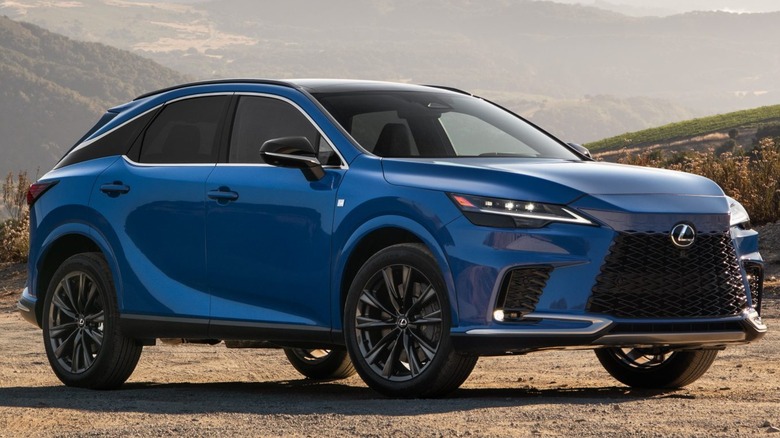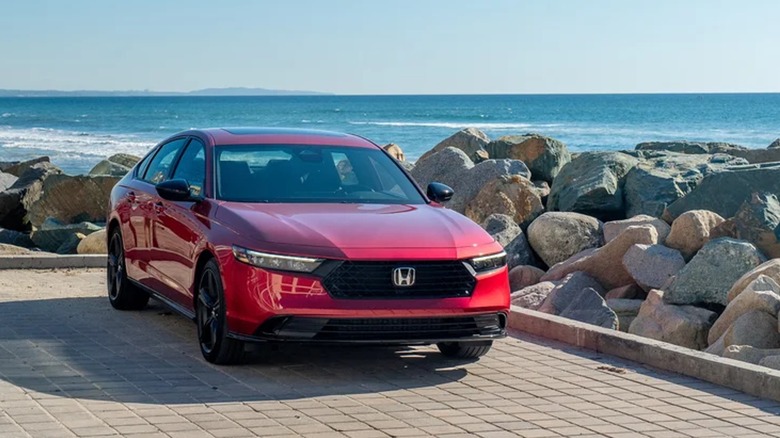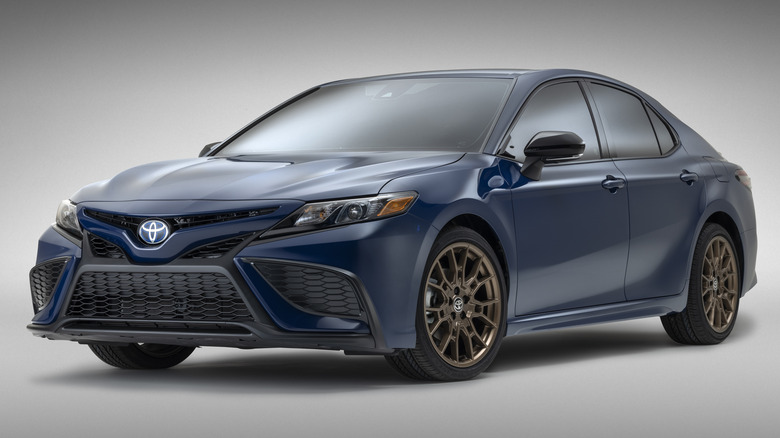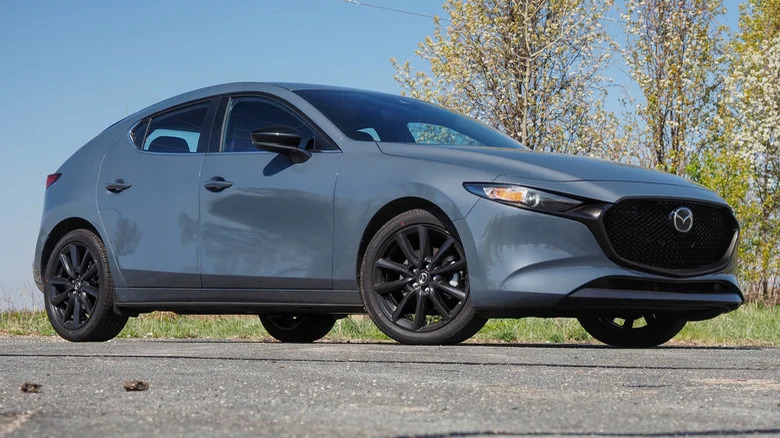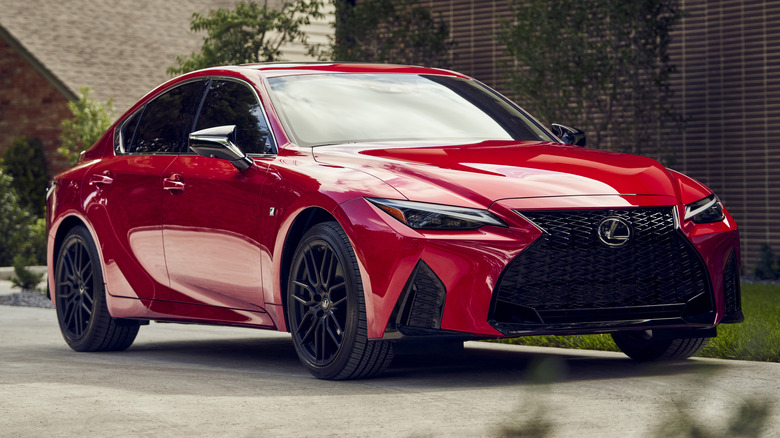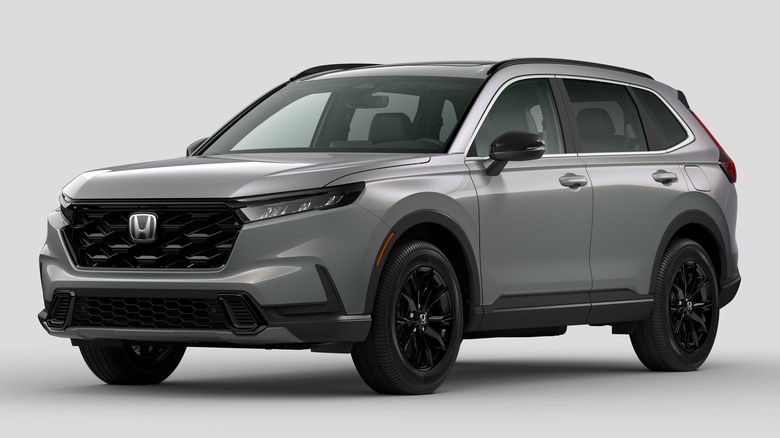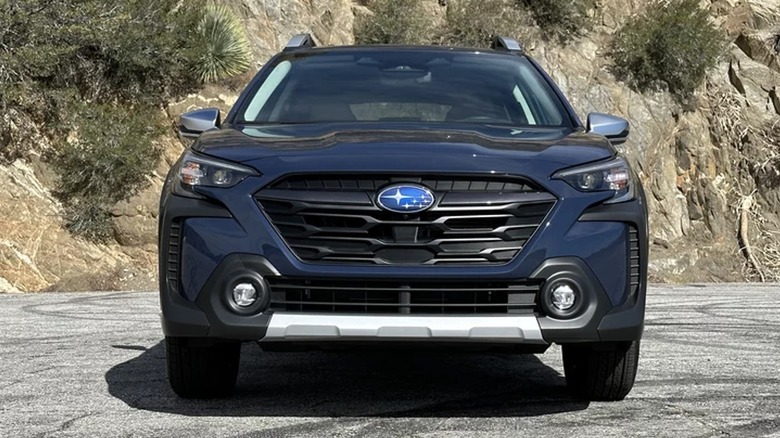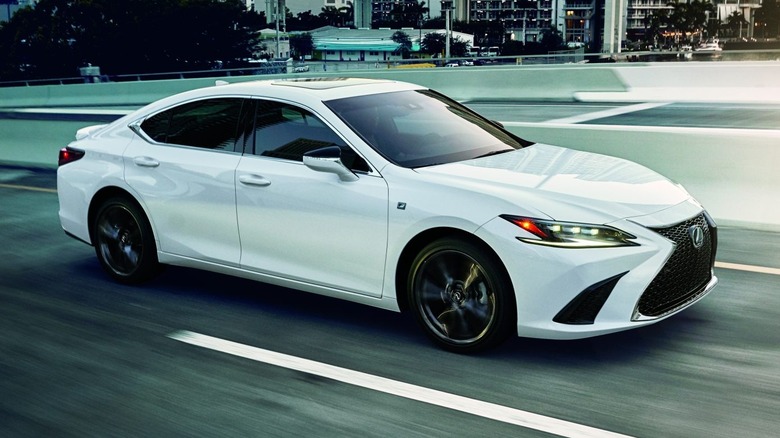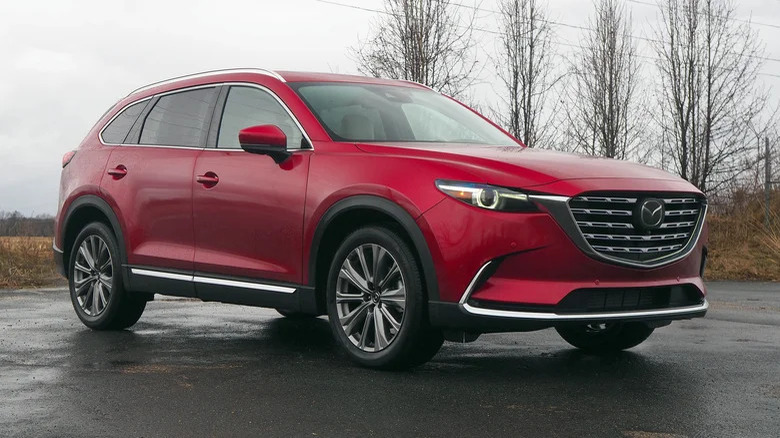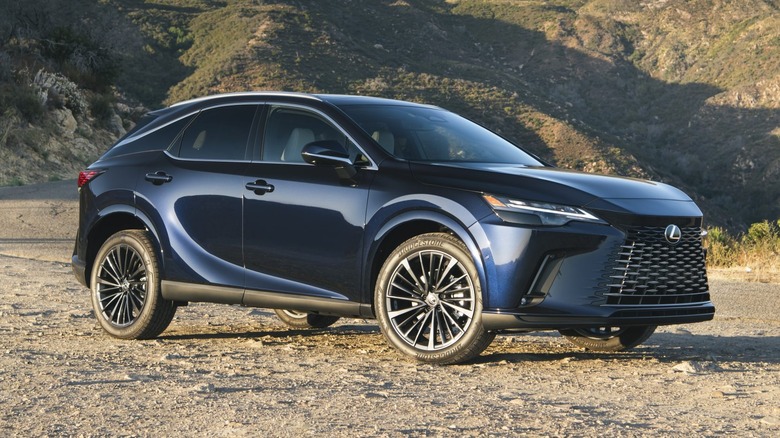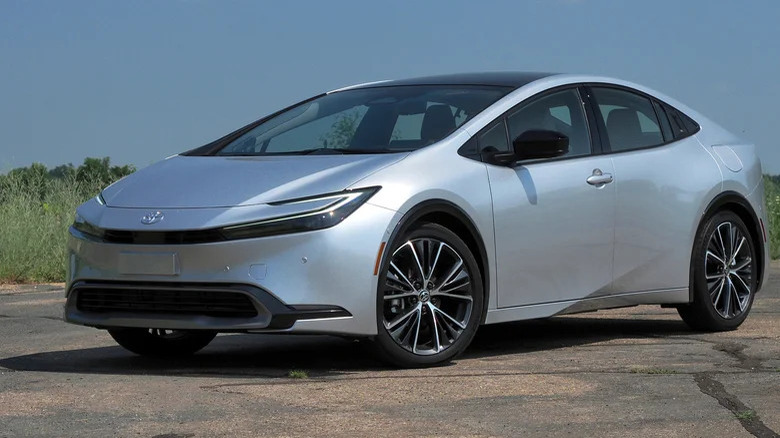10 Of The Most Reliable 4-Cylinder Cars Of 2023
While the superior power of V6 and V8 engines continue to prove popular with buyers, the truth is that many buyers just don't need the extra grunt. Four-cylinder engines are now more potent and efficient than ever and can be found across most segments in the car market. In addition, they offer a variety of advantages that make them even more appealing for everyday drivers.
They're often more affordable to buy and boast far better EPA ratings. Many also now come with mild hybrid assistance, giving them extra power off the line and reducing fuel bills even further. Plus, when paired with the right chassis, they can be just as much fun to drive as larger-engined cars. However, all those benefits don't count for much if the engine itself can't be relied upon. Thankfully though, there are plenty of highly dependable four-cylinder engines on the market in 2023.
To establish which models come out on top for reliability, we've used data from the research platform iSeeCars, which analyzes data from millions of used car listings to work out which models outperform their peers. These 10 cars all received top ratings in their segment and rank among the most reliable cars in dealerships right now.
Honda Accord
Given its hard-earned reputation for dependability, it should be no surprise to anyone that the Honda Accord remains one of the most reliable four-cylinder cars on the market. The 2023 Honda Accord saw the launch of an all-new generation, with a choice of both hybrid and unassisted four-pot engines. After spending some time with each, we thought the hybrid was the pick of the bunch, with a sprightlier feel off the line and a quieter cabin at cruising speeds.
The latest generation has also undergone a styling overhaul, and the result is a car that manages to be neither forgettable nor flashy. It looks more striking than the outgoing model, for sure, but not to the point where there's any risk of it looking dated in a few years.
Across the lineup, the Accord's value for money remains consistently strong, although the shrinking sedan market means there's less competition than there once was. Not to say that's much of a problem, really, as buyers looking for an affordable, comfortable sedan that's enjoyable to drive will find exactly what they're searching for with the Accord. The latest data from iSeeCars scores the model 9.2/10 for reliability.
Toyota Camry
Another sedan survivor, the Camry has so far outran the declining market demand and even offers a hotter TRD model for drivers looking for some extra thrills. That top-spec variant comes with a V6, however, so buyers on the hunt for a four-cylinder are limited to lower-spec trims. The appeal of the Camry is that it does exactly what buyers expect it to by delivering comfort, reliability, and practicality without breaking the bank.
We drove the current generation at launch in 2017 and found it to be an improvement over the outgoing car in almost every way. As the base option, the four-cylinder variant wasn't quite as smooth during harder acceleration, but around town, it remained both composed and very frugal. Much like the Honda Accord, several of the Camry's competitors back in 2018 have since been axed and replaced with crossovers, but the Toyota proves there's plenty of life left in the segment yet. There's also no sign that the Camry's reputation for reliability will be waning anytime soon, as iSeeCars gave the model a commendable 9.0/10 rating.
Mazda Mazda3
Mazda's chirpy Mazda3 hatchback has been on the market for a few years now, but it's no less appealing. Budget cars aren't always much fun to drive, but the Mazda3 defies the stereotype and is genuinely enjoyable to throw into corners on back roads. It also wins enthusiast points, as there's still a manual transmission on offer. A 191 horsepower 2.5L four-cylinder engine is standard, but a turbocharged variant is also available that takes power up to 250 horsepower.
That means the Mazda3 can hustle along when commanded, even if most buyers aren't likely to be testing its limits on a regular basis. Most buyers will likely use it as an urban runabout rather than a mile muncher, and even though we found its ride to be on the firmer side, it's more than comfortable enough for traversing potholed city roads.
A key part of the appeal of any small, affordable car is going to be not only its low upfront cost but also reasonable running costs, and the Mazda3 shouldn't disappoint in that department either. A reliability rating of 8.9/10 from iSeeCars means that it's very unlikely owners will have to deal with any unexpected maintenance bills for the first several years.
Lexus IS 300
Last updated for the 2021 model year, the Lexus IS 300 shows its age in several places. Most notably, the interior tech is a way off what the best in the class offer, and while its exterior styling has held up well, its fresher rivals arguably look sharper. Still, there's plenty to like about Lexus' entry-level sedan, not least its high reliability rating of 9.0/10, according to iSeeCars data. In base four-cylinder form, it also undercuts key rivals to the tune of several thousand dollars.
It might not be the most cutting-edge, but the IS 300's interior is still a very pleasant place to spend time, with the upholstery on our review car feeling suitably upscale but still durable. The ride was also consistently smooth, although buyers looking for the most driving enjoyment will be better served elsewhere. While the Lexus isn't a standout competitor against the German segment leaders, it's still more reliable than all of them, and some might well prefer its more conservative styling too.
Honda CR-V
Honda's midsize CR-V is available with a choice of two four-cylinder engines, either in 1.5L turbocharged form or as a naturally aspirated 2.0L with hybrid assistance. The turbocharged engine is good for 190 horsepower, while the hybrid churns out a combined 204 horsepower. The CR-V's combination of family-friendly practicality, competitive interior space, and reputation for reliability has helped it become a consistently strong seller for the brand, with close to 300,000 examples sold in the U.S. in 2023.
That reputation is backed up by iSeeCars' reliability data, which gives the SUV a 9.0/10 rating. Also noted by the research platform is the car's exceptional safety rating, which should provide extra peace of mind for buyers looking for an affordable family hauler. The generous cargo capacity should also prove to be useful –- with the rear seats up, there's 39.3 cu ft available, and when they're folded down, that figure increases to 76.5 cu ft.
Subaru Outback
Buyers of the Subaru Outback know what they're getting, but that's no bad thing. The SUV's core formula has remained the same for many years now, and with a shape that's closer to a lifted wagon than a regular SUV, there isn't really another car quite like it. The sub-$30,000 starting price puts it way below similarly-styled competitors from the likes of Audi and Mercedes-Benz, although after testing a range of Outback trims, we'd pay a little extra for the turbocharged engine that's available with higher trims.
While the base 2.5L four-cylinder did the job for everyday driving, part of the appeal of the Outback is that it's versatile both on and off the road. The 2.4L turbocharged engine makes full use of the 78 extra ponies it generates and feels noticeably quicker both around town and at higher speeds. No matter which engine you pick, the Outback comes with a CVT -– depending on your personal preference, this might not be a good thing. However, it does help the fuel economy for most trims remain competitive for the segment.
An all-terrain SUV isn't much use if it can't be relied upon, but current data suggests the Outback should remain thoroughly dependable whether it's used on or off the road. iSeeCars awards the current generation a rating of 8.8/10, putting it above most of its rivals in the affordable SUV segment.
Lexus ES 250
Lexus' midsize sedan remains largely unchanged coming into the 2024 model year, with a choice of three powertrains available. Of those, it's the base-spec ES 250 that just about edges ahead in iSeeCars' reliability rankings, earning a 9.1/10. It's powered by a 2.5L four-cylinder engine that makes 203 horsepower and 184 lb-ft of torque, quite a way behind the ES 350, which makes a full 99 horses and 83 lb-ft of torque more. It's not the variant to get for performance, then, although the ES 250 does benefit from all-wheel drive as standard, while the ES 350 makes do with standard front-wheel drive.
Across both variants, power is sent to the ground through an eight-speed automatic transmission. The ES 250 sits in a tough spot in the market, as sedans are far from the most in-demand segment right now, and both established German competitors and upstart challengers from the likes of Genesis offer higher horsepower figures and more driving fun. However, the ES 250's charms center around its comfort and refined ride, not to mention its class-leading reliability.
Mazda CX-9
The 2023 model year Mazda CX-9 will be the last of its kind, as it's being replaced with the CX-90 in 2024. However, the family-oriented SUV still has plenty to offer, and despite being one of the oldest designs, arguably still ranks among the best-looking in its class. All trims come equipped with a 2.5L turbo-four engine making 250 horsepower and 320 lb-ft of torque. Our reviewer also found it one of the most enjoyable cars in the segment to drive, with a sharper ride and more willingness to hustle than other SUVs.
It impresses as a family hauler too, even if the third row is far from the roomiest in the segment. We had no such complaints with either the first or second row, however, and found the cabin to be generally comfortable and well-equipped given the car's competitive starting price. That value for money continues with the CX-9's impressive reliability stats: iSeeCars gives it an 8.7/10, making it one of the most dependable SUVs of its size.
Lexus RX 350
The RX 350 is available with a variety of four-cylinder engines for 2024, but no matter which one buyers pick, it should be reliable. The model achieved a 9.0/10 rating in iSeeCars data, putting it significantly above its chief compact luxury SUV rivals. Indeed, it's luxury that's the car's biggest selling point, particularly because the front-wheel drive variant manages a rather leisurely 0-60 mph time of 7.6 seconds, which isn't going to rival the athleticism of equivalent BMWs or Audis.
The two rows of the RX can seat up to five passengers -– buyers looking for a third row will have to venture further up the brand's lineup. In general, cabin equipment levels are broadly comparable with what else is on offer in the segment. From the outside, the car's styling is largely cohesive without being particularly memorable. That said, the RX sports one of the more extreme interpretations of the gaping Lexus grille that has continued to polarize buyers despite being a ubiquitous feature on the brand's cars for around a decade now. The latest RX doesn't rewrite the rulebook set by previous generations of the SUV, but for loyal Lexus fans, that's not a bad thing.
Toyota Prius
The 2023 Toyota Prius is more than a little different from its predecessors. After more than two decades of being derided by critics as an amorphous blob of a car, the 2023 model is actually pleasant to look at. Not only that, but we thought it was better to drive, too, with its electrically-assisted 2.0L four-cylinder engine boasting improved performance both on paper and on the road. However, it's still not without its flaws. Its new powertrain still features a CVT, and although it helps the car achieve class-leading efficiency figures, the annoying whine present in older models can still be heard under heavier acceleration.
We weren't entirely sold on the car's cabin layout either, as the abundance of physical buttons and switches meant it was often tricky to find the right one at a glance. While the likes of Tesla attract frequent criticism for hiding key functions behind touchscreen menus, Toyota seems to have gone too far the other way here.
Really, those are minor gripes in what's otherwise a very appealing car for drivers looking to save on their fuel bills. The Prius still very much delivers on its core promise of being frugal and ergonomic, and data suggests it should be just as reliable as older cars too. For the latest model year, iSeeCars awarded the hybrid a reliability rating of 9.1/10.
